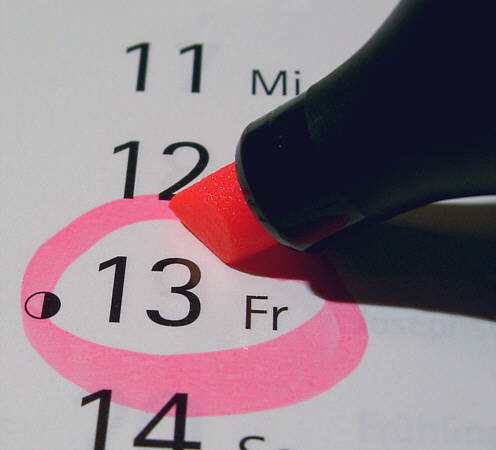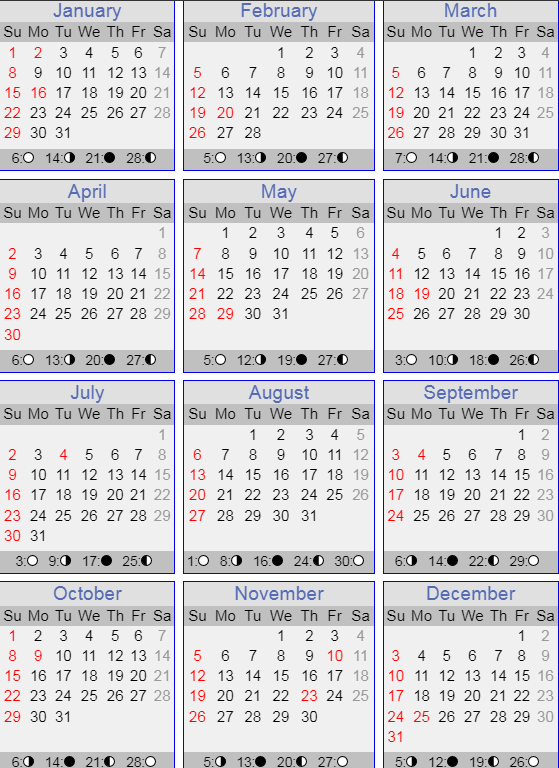
Friday the 13th occurs twice in 2023
Today is October 13, 2023, and it’s a Friday. And it’s the last of two Friday the 13ths in 2023. There was one in January. Does that mean 2023 is super unlucky? No. Any calendar year has at least one – but no more than three – Friday the 13ths. The last time we had only one Friday the 13th in a calendar year was in 2022. And the next time won’t be until 2025. Are you scared of Friday the 13th? Or has it just got a bad rap? It’s really just a feature of our Gregorian calendar, and a pretty common one at that.
We last had three Friday the 13ths in 2015, in February, March and November. We’ll have three again in 2026.
There’s a name for having an irrational fear of Friday the 13th: friggatriskaidekaphobia. Not that we at EarthSky suffer from this fear … but, gosh darn, this year’s first Friday the 13th was on January 13, 2023, and it happened exactly 39 weeks (3 x 13 weeks) before the second Friday the 13th in October 2023. And that’s not the end of it.
Next year, in 2024 (which also has two Friday the 13ths), the first of the two comes on September 13, 2024, exactly 13 weeks before the second Friday the 13th in December 2024. Then the sole Friday the 13th of 2025 falls on June 13, 2025, exactly 26 weeks (2 x 13 weeks) after the December 2024 Friday the 13th.
Yikes, that’s quite a few of coincidences involving the number 13 … though we could cite many more!
The 2024 lunar calendars are here! Best Christmas gifts in the universe! Check ’em out here.
Why do some people fear Friday the 13th?
Are all these 13’s a scary coincidence or is it super unlucky? Neither. It’s just a quirk of our calendar, as you’ll see as you keep reading.
The fact is that, according to folklorists, there’s no written evidence that Friday the 13th was considered unlucky before the 19th century. The earliest known documented reference in English appears to be in Henry Sutherland Edwards’ 1869 biography of the composer Gioacchino Rossini, who died on a Friday the 13th.
Unlucky? I don't think so. The 13th is more likely to be a Friday than any other day of the week! https://t.co/aKfOawx8w7 pic.twitter.com/Che7xmZJrv
— Nick Berry (@DataGenetics) October 13, 2017
Has Friday the 13th got a bad rap?
Friday has always gotten a bad rap regardless of its number in the month. Even in the Middle Ages, people would not marry – or set out on a journey – on a Friday.
There are also some links between Christianity and an ill association with either Fridays or the number 13. Jesus was said to be crucified on a Friday. Seating 13 people at a table would supposedly bring bad luck because Judas Iscariot, the disciple who betrayed Jesus, was the 13th guest at the Last Supper. Meanwhile, our word for Friday comes from Frigga, an ancient Norse goddess of marriage and fertility. Christians called Frigga a witch and Friday the witches’ Sabbath.
In modern times, the slasher-movie franchise Friday the 13th has helped keep friggatriskaidekaphobia alive.
Everything We Know About The New #FridayThe13th Show ‘Crystal Lake’ So Farhttps://t.co/TGCVDkaD6y
— Friday The 13th: The Franchise (@F13thFranchise) November 24, 2022
In 2023, blame a common year starting on Sunday.
Whenever a common year of 365 days starts on a Sunday, it’s inevitable that the months of January and October will start on a Sunday. And any month starting on a Sunday always has a Friday the 13th. So this year, in 2023, both January and October have a Friday the 13th.
The last time a common year started on a Sunday was 6 years ago, in the year 2017. Before that, it was in the year 2006. This marked the first time in the 21st century (2001 to 2100) that New Year’s Day started on a Sunday.
Some of you may wonder if there’s some formula that governs how this twofold Friday the 13th drama repeats itself. The answer is a definite yes. Keep in mind that this January-October Friday the 13th year can only happen in a common year of 365 days, and when January 1 falls on a Sunday.
Any calendar year that happens three years after a leap year will recur in cycles of 11, 22 and 28 years. Therefore, if our twofold Friday the 13th year comes three years after a leap year, as it does in 2023, the days and dates will match up again in 11, 22 and 28 years. So the years 2034, 2045 and 2051 will all harbor January and October Friday the 13ths:
2023 + 11 = 2034
2023 + 22 = 2045
2023 + 28 = 2051
Calendar for 2023

How often does a Friday the 13th happen in January and October?
More often than you might imagine! The first January-October Friday the 13th year in the 21st century (2001 to 2100) occurred in 2006, which is two years after a leap year. Any calendar year happening two years after a leap year will have days and dates matching up again in periods of 11, 17 and 28 years:
2006 + 11 = 2017
2006 + 17 = 2023
2006 + 28 = 2034
Next, we continue the cycle onward to find a grand total of 10 January-October Friday the 13th years for the 21st century (2001 to 2100):
2006, 2017, 2023, 2034, 2045, 2051, 2062, 2073, 2079 and 2090
Because the year 2090 is two years after a leap year, we might be tempted to project the next January-October Friday the 13th to the year 2101:
2090 + 11 = 2101
Looking ahead to 22nd century
Alas, here’s where the Gregorian calendar throws a monkey wrench at us. And by Gregorian calendar rules, century years not equally divisible by 400 (e.g. 2100, 2200, 2300) are not leap years of 366 days – but rather, common years of 365 days. So the suppression of the leap year in 2100 perturbs the cycle, bringing about the first January-October Friday the 13th year of the 22nd century (2101 to 2200) in the year 2102, instead of 2101.
By good fortune, we can pretend that the year 2102 comes two years after a leap year, to project the recurrence of January-October Friday the 13th years in periods of 11, 17 and 28 years.
2102 + 11 = 2113
2102 + 17 = 2119
2102 + 28 = 2130
We continue the cycle onward to find a total of 11 January-October Friday the 13th years for the 22nd century (2100 to 2200):
2102, 2113, 2119, 2130, 2141, 2147, 2158, 2169, 2175, 2186 and 2192
And the 23rd century
In the 23rd century (2201 to 2300), the cycle is perturbed again. The first January-October Friday the 13th year does not fall in 2203 – but rather in 2209, which is one year after a leap year. Any calendar year happening one year after a leap year recurs in 6, 17 and 28 years.
Thus, we find 11 January-October Friday the 13th years for the 23rd century (2201 to 2300):
2209, 2215, 2226, 2237, 2243, 2254, 2265, 2271, 2282, 2293 and 2299
And the 24th century
Then in the 24th century (2301 to 2400), the cycle is again perturbed. The first January-October Friday the 13th year does not come in 2310 – but rather in 2305, or one year after a leap year. That gives 11 January-October Friday the 13th years for the 24th century (2301 to 2400):
2305, 2311, 2322, 2333, 2239, 2350, 2361, 2367, 2378, 2389 and 2395
Because the year 2400 IS a leap year of 366 days, the cycle is NOT perturbed in the following 25th century (2401 to 2500). So we can keep on going to find 10 January-October Friday the 13th years for the 25th century (2401 to 2500).
2406, 2417, 2423, 2434, 2445, 2451, 2462, 2473, 2479 and 2490
Rhyme and reason for the 400-year Friday the 13th cycle.
Because the Gregorian calendar has a 400-year cycle, the January-October Friday the 13th years recur in cycles of 400 years. For example, respective January-October Friday the 13th calendar years are exactly 400 years apart in the 21st and 25th centuries:
21st century (2001 to 2100):
2006, 2017, 2023, 2034, 2045, 2051, 2062, 2073, 2079 and 2090
25th century (2401 to 2500):
2406, 2417, 2423, 2434, 2445, 2451, 2462, 2473, 2479 and 2490
Gregoriana cycle of 372 years.
It appears as though cycles of 372 and 400 years (372 + 28) prevail over the long course of centuries. Take the year 2023, for instance:
2023 + 372 = 2395
2023 + 400 = 2423
The 372-year period is known as the Gregoriana eclipse cycle, which we elaborate about in our post How often does a solar eclipse happen on the March equinox?
As magical as all of this Friday the 13th calendar intrigue appears to be, it’s not supernatural. But it’s entertaining number play, even if it may haunt our uncomprehending minds.
Friday the 13th, by the numbers | @DataGenetics https://t.co/ET7kqCAqY4
Image via: https://t.co/5GcrRV6nC9 pic.twitter.com/r3IuwSmnkz— VMware Tanzu Data (@VMWareTanzuData) November 13, 2015
Can a leap year start on a Sunday?
Yes, a leap year of 366 days can start on a Sunday. It last occurred in the year 2012 and will next happen in 2040. Any leap year starting on a Sunday has three Friday the 13ths which fall in January, April and July. The days and dates of any leap year match up again in periods of 28 years. So we have only four January-April-July Friday the 13th years in the 21st century (2001 to 2100):
2012, 2040, 2068 and 2096
Bottom line: Scared of Friday the 13th? It’s just a feature of our Gregorian calendar, and a pretty common one at that. And from what we’ve been able to gather, the 400-year cycle displayed by the Gregorian calendar features 688 Friday the 13ths.











